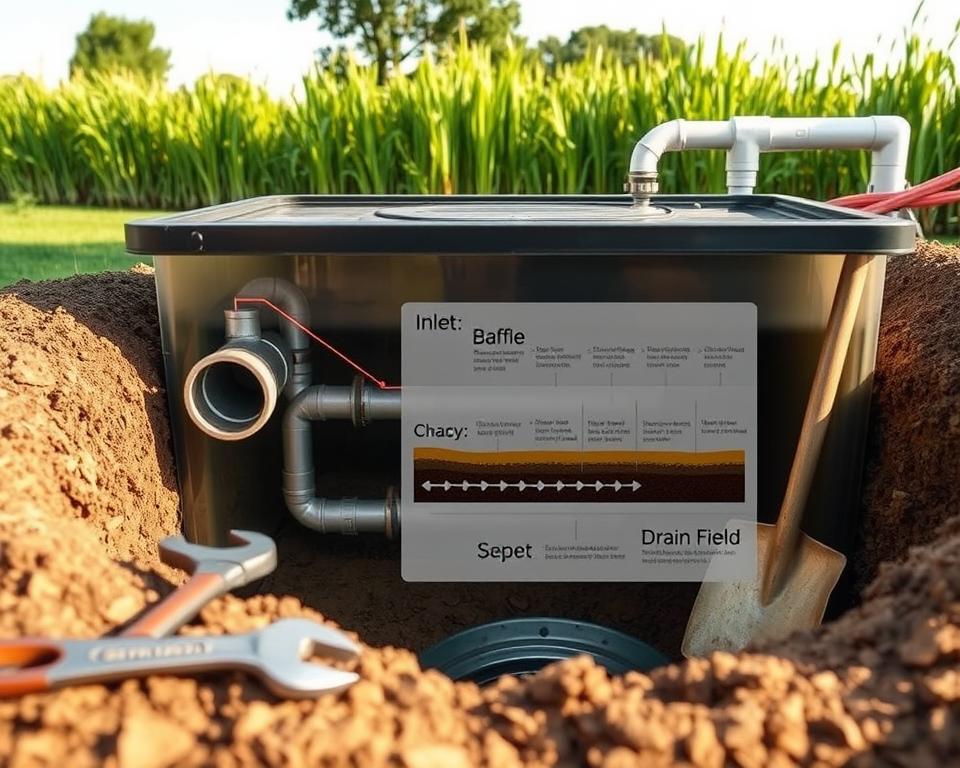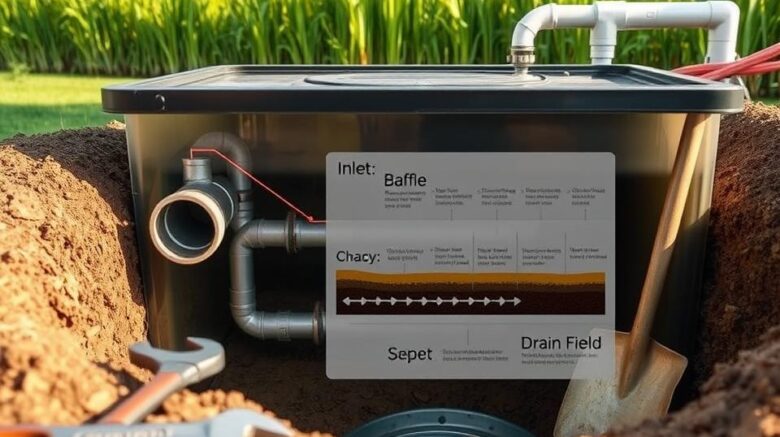Replacing a Septic Tank Pump: A Complete Guide
Have you considered the aftermath of a Septic Tank Pump shutdown? For many, it’s a scenario that leads to considerable anxiety and sudden outlays. Identifying the necessity for prompt replacement is vital in keeping a efficient and clean Septic system. By scheduling routine system checks, including prompt repair needs, you increase your system’s life while avoiding pricey emergencies. Companies like All in Sanitation fulfil a major role in maintaining your Septic tank operating smoothly. This guide delivers a clear overview of Septic Tank Pump replacement, detailing alert signals and upkeep suggestions for septic pumping.
Crucial Summaries
- Understanding the job of a Septic Tank Pump is important for homeowners.
- Early Septic Tank Pump replacement can lower overall spending.
- Regular maintenance and cleaning are central to prolonging the lifespan of your Septic system.
- Skilled support can properly handle Septic system Pump repair and maintenance.
- Detecting first indicators of Pump failure can sidestep expensive fixes.
Septic System Basics
A Septic system is crucial for homes without access to city sewer lines. It handles and eliminates household wastewater properly. The Septic tank is central to this system’s performance, serving an important role in the process.
The Septic tank accepts sewage, partitioning solids from lighter matter. This split is crucial for effective wastewater treatment. The treated water then flows to the drain field, where it receives further filtration by the soil, shielding groundwater.
Grasping how your Septic system works can increase its life and efficiency. Routine maintenance is essential for the Septic tank and the system’s overall health. Homeowners must familiarize themselves with their system’s particulars to prevent harm to the environment and prevent pricey renovation.
Defining a Septic Tank
A Septic tank is a subsurface, leak-proof container critical for household waste management systems. It’s essential to grasp the Septic tank’s main role: it deals with sewage waste storage by processing it. This setup functions by isolating solids from liquids, promoting basic wastewater treatment and sanitation.
Its operation is powered by naturally occurring microorganisms that break down waste. In areas without centralized sewage treatment, Septic tanks are irreplaceable. They store sewage long enough for solids to descend, forming sludge. Meanwhile, liquid effluent collects above, preparing for filtration in the drainage field.
Maintaining a Septic tank in sound shape is essential for its effectiveness and service life. Regular maintenance is necessary to preventing issues like backups and overflows. These issues can result in pricey restorations and pose environmental hazards. In essence, Septic tanks play a significant role in maintaining cleanliness and safety, especially in rural areas.

Warning Signs of Pump Failure
Homeowners should be aware of signs that their Septic tank may need a new Pump. A clear sign is experiencing foul odors at drains or in the yard, signaling a system failure. Experiencing regular or serious sewage backups in your home calls for prompt action to stop worse issues.
Seeing slow draining drains shows a potential problem. Fixtures like sinks, showers, or toilets that empty slowly might indicate a Pump failure or a clog calling for an expert’s evaluation. Additionally, spots of unusually lush vegetation in your yard could suggest trouble; this reveals waste leakage, resulting in overflow concerns.
To prevent large, pricey repairs, homeowners should address these clues immediately. Performing consistent inspections and maintenance is vital for the Septic system’s optimal function.
| Signs | Description |
|---|---|
| Foul Odors | Unpleasant smells around drains or yard pointing to system failure. |
| Sewage Backup | Recurring overflows in sinks or toilets pointing to potential Pump issues. |
| Slow Draining Drains | Fixtures draining slowly can mean blockages or Pump malfunction. |
| Lush Vegetation | Areas of overgrowth near the tank indicating possible overflow. |
How Often Should You Replace Your Septic Pump?
Grasping the schedule for replacing your Septic Pump is essential for a smooth-running Septic system. It’s wise to have your system checked every three years. A trained technician during these visits provides information into how well your system performs.
Usually, emptying the Septic tank becomes needed every five years. However, households with greater water use or a big family might need more frequent servicing. Correct upkeep of your Septic system thwarts costly repairs and prolongs its lifespan. Technicians in Septic services can create a maintenance plan that suits your needs and the details of your system.
Staying ahead with Septic Pump replacements secures your system’s peak performance and guards your home investment. Regular inspections and upkeep prevent sudden bills. They support efficient system flow.
Cost of Septic Tank Pump Replacement
The Septic Pump replacement cost varies, shaped by many elements. Homeowners should expect spending between $500 to $1,300 for a new Pump. This price spectrum covers diversity in the style of Pump and material needs. It’s vital to include the Pump and Septic tank servicing costs for the fitting and mandatory inspections.
Costs can also rise due to issues within the Septic system or local wage levels. Essential repairs, caused by wear or harm, could inflate the total outlay. In reviewing financial estimates for Septic services, factor in charges for scheduled service, assessments, and any sudden problems since these factors critically aid in maintaining your system’s longevity.
Budgeting for routine Septic service lessens the impact of sudden charges. Proactive budgeting aids homeowners in covering expenses linked to the Pump’s replacement and system upkeep.
How Pump Replacement Works
The Septic Tank Pump replacement starts with a thorough inspection of the system. This opening check identifies any additional issues beyond the Pump itself. The faulty Pump is then pulled carefully and efficiently.
Installing the new Pump involves careful attention to connection security, guaranteeing no leaks. Expert crews ensure the installation is properly executed, lessening future issues.
The closing stage is a thorough post-installation check. It checks peak operation, providing homeowners security. With qualified aid, the process is smooth, bringing limited interruption.
Septic Tank Pump Installation Best Practices
When tackling Septic Pump installation, it’s essential to adhere to best practices. Engaging licensed contractors secures compliance with local regulations. They expertly manage the installation nuances, avoiding errors common in inexperienced setups.
Following strict Septic service standards is important for harmonious performance. Opting for suitable parts and reliable materials lengthens the Pump’s life and boosts the Septic system’s efficiency. This precise approach enhances maintenance and overall performance longevity.
- Pick a reputable service provider who specializes in Septic systems.
- Make certain that all necessary permits and inspections are in place before work kicks off.
- Install Pumps that meet the specific requirements of your Septic system.
- Schedule a pre-installation inspection to assess site conditions.
- Account for the layout and flow of the Septic system during installation.
Following these guidelines leads to a hassle-free fit-out. It also provides a dependable system for sound wastewater control.
Septic Tank Maintenance Tips
Avoiding costly problems with your Septic system begins with regular maintenance. By following easy guidelines, homeowners can maintain their Septic systems’ efficiency. Booking periodic reviews is a smart move. It helps identify and rectify problems before they become major.
It’s also necessary to stop flushing undesirable things down the drain. Fat, chemicals, and items that don’t break down can injure your system. Decreasing water use during busy periods can also ease system load.
Scheduling expert services with entities like All in Sanitation is important for Septic health. Understanding what you should and shouldn’t do with your Septic tank can materially boost its lifespan and safeguard your household environment.
Cleaning Service Basics
Routine Septic tank cleaning is important for your system’s long-term function and efficiency. The process comprises removing sludge, inspecting for damage, and ensuring everything operates properly. These steps are necessary to keep your system running smoothly and avoid expensive fixes.
A detailed Septic maintenance plan should include frequent checks and cleanings that match your specific usage. Homeowners must realize the importance of regular upkeep to prevent issues like backups. Hiring experts ensures the cleaning is thorough, promoting a healthier living space.
| Service Type | Frequency | Benefits |
|---|---|---|
| Pumping | Every 3-5 years | Prevents system failure and backups |
| Inspection | Annually | Identifies potential issues early |
| Maintenance | As needed | Lengthens the lifespan of the system |
Putting money into periodic Septic tank cleaning saves money and extends your system’s life. It supports uninterrupted waste treatment. Moving promptly safeguards your Septic system’s efficiency for the future.
Picking a Pump Replacement Provider
Locating a reputable Septic service provider is crucial when replacing a Septic Tank Pump. Start by checking their certifications and licenses. Such credentials demonstrate the company’s compliance with industry norms, critical for a smooth replacement process.
Delving into customer reviews is also a critical step. Past feedback indicates service quality, supporting the filtering process. Go with companies with a strong track record of stellar work ethics and customer support.
Acknowledge recommendations from your social circle too. Insights from friends and neighbors can highlight top-notch Septic services in your vicinity. Always ask for detailed instances of their positive experiences with these services.
Finally, compare the range of services and cost from various firms. A comprehensive analysis secures exceptional service and optimizes the value of your expenditure. Following these guidelines ensures your Septic system receives the best care it deserves.
Deciding Between DIY and Pros
Homeowners often debate whether to manage Septic issues by themselves or seek professional help. DIY Septic maintenance is attractive for basic fixes and upkeep. For example, monitoring Septic tank levels or cleaning drains can be done solo.
Conversely, recognizing when to hire Septic professionals is vital for serious problems. Heavy-duty repairs, replacing systems, or major clogs demand special tools and expertise. Without the proper expertise, attempts to resolve these problems can lead to environmental harm and extensive damage.
Determining between DIY and professional help demands evaluating the job’s complexity. Presented below are examples highlighting when DIY is suitable and when professional Septic services are recommended:
| Situation | DIY Feasibility | Need for Professional Help |
|---|---|---|
| Routine maintenance (e.g., tank level checks) | Yes | No |
| Minor clogs in drain fields | Yes | No |
| Major Septic Tank Pump failure | No | Yes |
| Complex sewage backflow issues | No | Yes |
| Regular system inspections | DIY optional | Yes for thorough checks |
Making informed decisions on these matters assures safety and efficiency. Picking the right option both protects and preserves the Septic system but also prevents unexpected costs.
Conclusion
Understanding the workings of your Septic system is vital for its effective management and your home’s performance. Recognizing first symptoms of issues prevents pricey repairs and safeguards the system’s integrity. This forward-thinking approach helps the environment and boosts your property value.
To maintain your Septic system in excellent condition, focus on maintenance. This involves regular inspections and scheduled professional Pumping. This reasonable spend protects your home’s safety and your wellbeing. Your Septic system thrives with diligent attention.
Our team at All in Sanitation is focused on supplying premium Septic care. We deliver the skill needed to ensure your system working optimally, safeguarding your home investment over time. With our commitment to reliable support and reliability, we’re here for your Septic maintenance needs.
